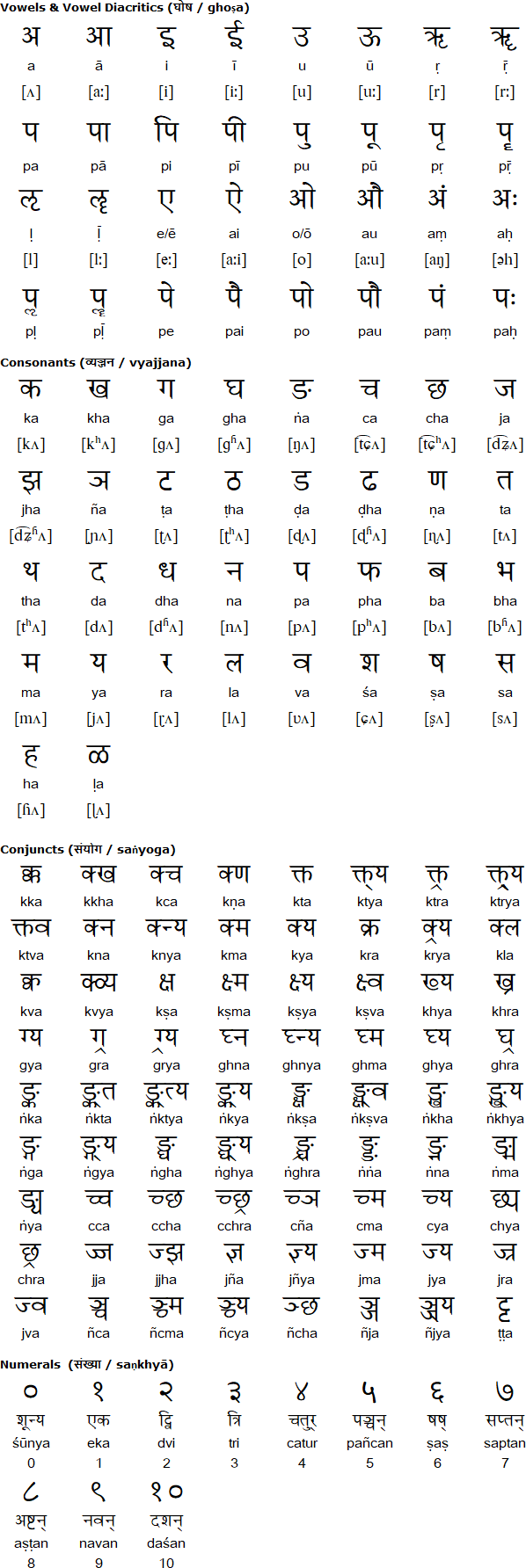Sanskrit is the classical language of Indian and the liturgical language of Hinduism, Buddhism, and Jainism. It is also one of the 22 official languages of India. The name Sanskrit means "refined", "consecrated" and "sanctified". It has always been regarded as the 'high' language and used mainly for religious and scientific discourse.
Vedic Sanskrit, the pre-Classical form of the language and the liturgical language of the Vedic religion, is one of the earliest attested members of the Indo-European language family. The oldest known text in Sanskrit, the Rigveda, a collection of over a thousand Hindu hymns, composed during the 2nd millenium BC.
Today Sanskrit is used mainly in Hindu religious rituals as a ceremonial language for hymns and mantras. Efforts are also being made to revive Sanskrit as an everyday spoken language in the village of Mattur near Shimoga in Karnataka. A modern form of Sanskrit is one of the 17 official home languages in India.
There are about 24,800 people in India who speak Sanskrit as a first language, in particularly in Allahabad, Jaunpur, Kaushambi, and Pratagarh districts of Uttar Pradesh state, and also in Delhi and other cities. Another 5 million people in India use Sanskrit as a second language, and 3,000 people in Nepal do so as well.
Since the late 19th century, Sanskrit has been written mostly with the Devanāgarī alphabet. However it has also been written with all the other alphabets of India, except Gurmukhi and Tamil, and with other alphabets such as Thai and Tibetan. The Bhaiksuki, Grantha, Sharda and Siddham alphabets are used only for Sanskrit.
Since the late 18th century, Sanskrit has also been written with the Latin alphabet. The most commonly used system is the International Alphabet of Sanskrit Transliteration (IAST), which was been the standard for academic work since 1912.

Note: there are about a thousand conjunct consonants, most of which combine two or three consonants. There are also some with four-consonant conjuncts and at least one well-known conjunct with five consonants. This is a selection of commonly-used conjuncts.

Translated into Sanskrit by Arvind Iyengar
Sarvē mānavāḥ svatantrāḥ samutpannāḥ vartantē api ca, gauravadr̥śā adhikāradr̥śā ca samānāḥ ēva vartantē. Ētē sarvē cētanā-tarka-śaktibhyāṁ susampannāḥ santi. Api ca, sarvē´pi bandhutva-bhāvanayā parasparaṁ vyavaharantu.
Hear a recording of this text by Muralikrishnan Ramasamy

Sarvē mānavāḥ janmanā svatantrāḥ vaiyaktikagauravēṇa adhikārēṇa ca tulyāḥ ēva, sarvēṣāṃ vivēkaḥ ātmasākṣī ca vartatē, sarvē parasparaṃ bhrātṛbhāvēna vyavaharēyuḥ.
Hear a recording of this text by Shriramana Sharma
Some details provided by Shriramana Sharma and Krittathat Kaeofung
All human beings are born free and equal in dignity and rights. They are endowed with reason and conscience and should act towards one another in a spirit of brotherhood.
(Article 1 of the Universal Declaration of Human Rights)
Information about Sanskrit | Phrases | Numbers | Tower of Babel | Writing systems for Sanskrit: Devanagari, Bhaiksuki, Brahmi, Galik, Grantha, Gupta, Kadamba, Kharosthi, Nandinagari, Sharda, Siddham, Thai, Tibetan
Information about the Sanskrit language
http://en.wikipedia.org/wiki/Sanskrit
https://www.ethnologue.com/language/san
https://www.worldhistory.org/Sanskrit/
Online Sanskrit lessons
https://learnsanskrit.org/
https://learnsanskritlanguage.com/
https://learnsanskritonline.com/
https://sgc.best/
Sanskrit phrases
http://en.wikibooks.org/wiki/Sanskrit/Everyday_Phrases
Sanskrit dictionaries
http://www.uni-koeln.de/phil-fak/indologie/tamil/cap_search.html
https://www.sanskrit-lexicon.uni-koeln.de/scans/MWScan/tamil/
Devanagari fonts and keyboards
http://www.wazu.jp/gallery/Fonts_Devanagari.html
http://www.devanagarifonts.net
http://www.sanskritweb.net/cakram/
Sanskrit Library - contains digitized Sanskrit texts and various tools to analyse them
http://sanskritlibrary.org/
ALPHABETUM - a Unicode font
for ancient scripts, including Classical & Medieval Latin, Ancient Greek, Etruscan, Oscan, Umbrian, Faliscan, Messapic, Picene, Iberian, Celtiberian, Gothic, Runic, Old & Middle English, Hebrew, Sanskrit, Old Nordic, Ogham, Kharosthi, Glagolitic, Anatolian scripts, Phoenician, Brahmi, Imperial Aramaic, Old Turkic, Old Permic, Ugaritic, Linear B, Phaistos Disc, Meroitic, Coptic, Cypriot and Avestan.
https://www.typofonts.com/alphabetum.html
Awadhi, Assamese, Bagri, Bengali, Bhili, Bishnupriya Manipuri, Braj, Chakma, Chhattisgarhi, Chittagonian, Desiya, Dhatki, Dhivehi, Dhundari, Fiji Hindi, Gawar Bati, Gujarati, Hajong, Halbi, Haryanvi, Hindi, Hindko, Kannauji, Khandeshi, Konkani, Kotia, Kumaoni, Kutchi, Lambadi, Marathi, Marwari, Mewari, Modi, Nimadi, Noakhailla, Odia, Parkari Koli, Punjabi, Rajasthani, Rajbanshi, Rangpuri, Rohingya, Saraiki, Sarnámi Hindustani, Sindhi, Sinhala, Sourashtra, Sugali, Sylheti, Tanchangya, Urdu
Aka-Jeru, Angika, Athpare, Avestan, Awadhi, Bahing, Balti, Bantawa, Belhare, Bhili, Bhumij, Bilaspuri, Bodo, Bhojpuri, Braj, Car, Chamling, Chhantyal, Chhattisgarhi, Chambeali, Danwar, Dhatki, Dhimal, Dhundari, Digaro Mishmi, Dogri, Doteli, Gaddi, Garhwali, Gondi, Gurung, Halbi, Haryanvi, Hill Miri, Hindi, Ho, Jarawa, Jaunsari, Jirel, Jumli, Kagate, Kannauji, Kham, Kangri, Kashmiri, Khaling, Khandeshi, Kharia, Khortha, Korku, Konkani, Kullui, Kumaoni, Kurmali, Kurukh, Kusunda, Lambadi, Limbu, Lhomi, Lhowa, Magahi, Magar, Mahasu Pahari, Maithili, Maldivian, Malto, Mandeali, Marathi, Marwari, Mewari, Mundari, Nancowry. Newar, Nepali, Nimadi, Nishi, Onge, Pahari, Pali, Pangwali, Rajasthani, Rajbanshi, Rangpuri, Sadri, Sanskrit, Santali, Saraiki, Sirmauri, Sherpa, Shina, Sindhi, Sunwar, Sylheti, Tamang, Thakali, Thangmi, Wambule, Wancho, Yakkha, Yolmo
Page last modified: 01.08.22
[top]
You can support this site by Buying Me A Coffee, and if you like what you see on this page, you can use the buttons below to share it with people you know.

If you like this site and find it useful, you can support it by making a donation via PayPal or Patreon, or by contributing in other ways. Omniglot is how I make my living.
Note: all links on this site to Amazon.com, Amazon.co.uk
and Amazon.fr
are affiliate links. This means I earn a commission if you click on any of them and buy something. So by clicking on these links you can help to support this site.
[top]